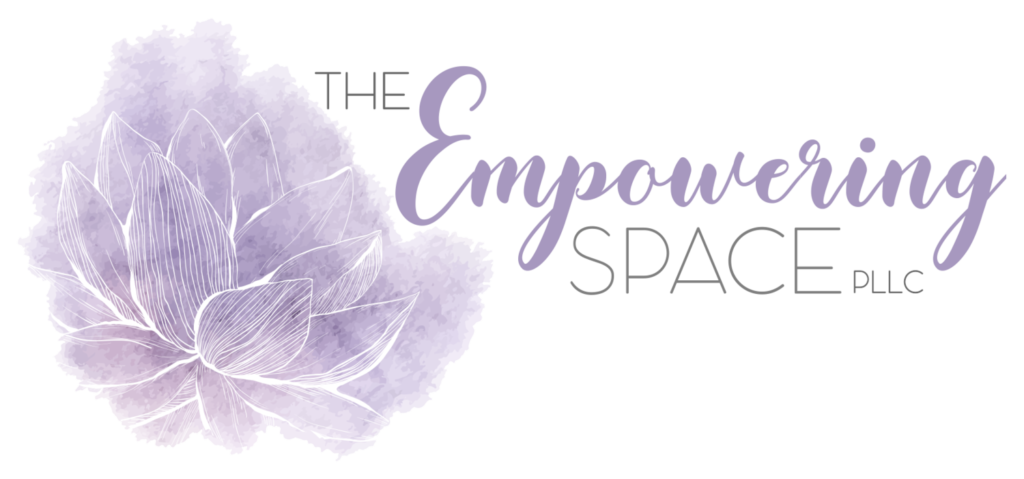Text Based Therapy: Complete Guide & Benefits for 2025
Picture this: It’s 2 AM, you’re lying awake spiraling with anxiety about tomorrow’s presentation, and traditional therapy offices are closed. Your thoughts are racing, but you can’t call anyone at this hour. This scenario perfectly captures why digital mental health solutions have become a game-changer for millions of people, especially millennials juggling demanding careers, student loans, and the constant pressure of modern life.

Text based therapy represents a revolutionary shift in mental health care delivery, offering 24/7 access to licensed therapists through secure messaging platforms. Unlike traditional face-to-face sessions, this innovative approach allows you to communicate with your therapist anytime, anywhere, making mental health support as accessible as sending a message to a friend.
Recent studies published in the Journal of Telemedicine and e-Health demonstrate that digital therapy methods are not only effective but often generate greater satisfaction in terms of delivery, accessibility, and affordability compared to traditional approaches. For a generation that grew up texting, this digital-first approach to mental health care feels natural and removes many barriers that prevent people from seeking help.
What is Text Based Therapy?
Text based therapy, also known as messaging therapy or digital counseling, is a form of online therapy where licensed mental health professionals provide counseling and support through secure messaging platforms. Unlike video sessions or phone calls, this method allows for asynchronous communication, meaning you can send messages to your therapist throughout the day and receive thoughtful responses when they’re available.

This therapy method isn’t just casual texting – it’s a structured, evidence-based approach to mental health treatment. Licensed therapists use the same therapeutic techniques they would in traditional settings, including cognitive behavioral therapy (CBT), dialectical behavior therapy (DBT), and trauma-informed care approaches. The primary difference lies in the delivery method, which offers unique advantages for certain individuals and situations.
Digital messaging services typically operate through secure, HIPAA-compliant platforms that ensure your conversations remain private and confidential. Many platforms also offer unlimited messaging, allowing you to communicate with your therapist as often as needed without worrying about hourly rates or appointment scheduling constraints.
The flexibility makes it particularly appealing to busy professionals, students, parents, and anyone who struggles with the rigid scheduling requirements of traditional therapy sessions. You can engage in therapeutic work during your lunch break, late at night, or whenever you need support most.
How Digital Counseling Works: A Step-by-Step Guide
Understanding how messaging therapy operates can help you determine if this approach aligns with your mental health needs and lifestyle. The process is designed to be straightforward while maintaining the same therapeutic standards as traditional mental health services.
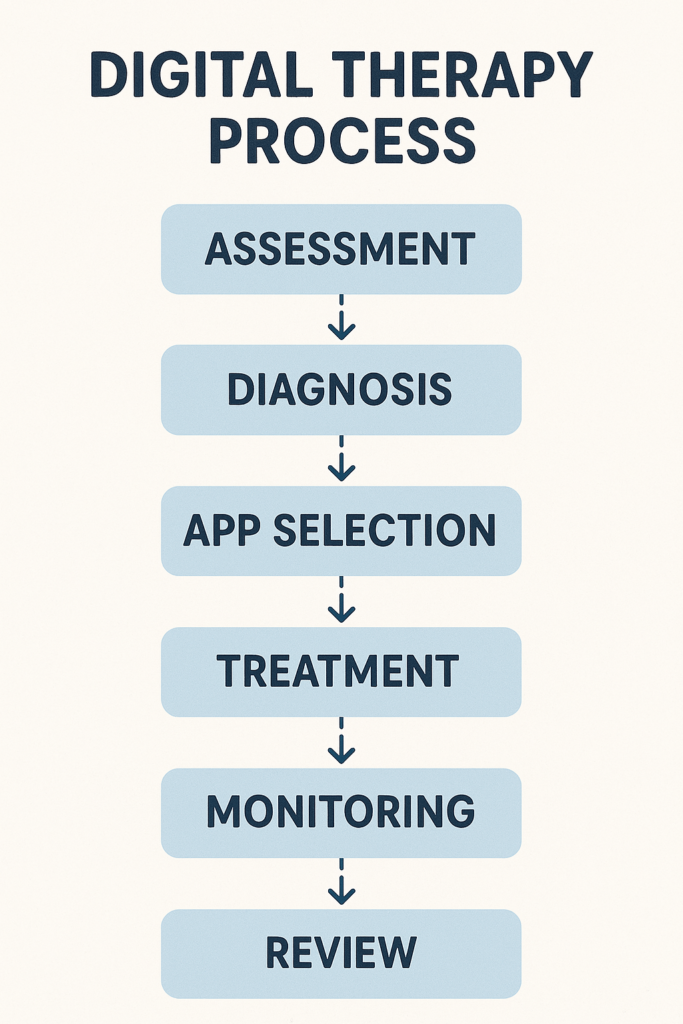
Initial Assessment and Therapist Matching
Most platforms begin with a comprehensive intake assessment that evaluates your mental health conditions, therapeutic goals, and preferences. This information helps match you with a licensed therapist who specializes in your specific concerns, whether that’s anxiety, depression, trauma, or relationship issues. The matching process considers factors like therapeutic approach, availability, and communication style to ensure the best possible fit.
Platform Setup and Security
Once matched, you’ll gain access to a secure messaging platform where all communication takes place. These platforms are typically HIPAA-compliant and use end-to-end encryption to protect your privacy. You’ll receive login credentials and instructions for accessing your private chat room where you and your therapist will communicate.
Ongoing Communication Structure
Digital sessions operate differently than traditional 45-minute appointments. Instead, you have continuous access to your therapist through unlimited messaging or structured response schedules. Some therapists respond multiple times daily, while others may have set response windows (such as within 24-48 hours). This flexibility allows for real-time support during crisis moments and ongoing therapeutic work between traditional session times.
Therapeutic Interventions via Messaging
Licensed therapists deliver evidence-based interventions through carefully crafted messages. For cognitive behavioral therapy, this might include homework assignments, thought challenging exercises, and behavioral activation techniques. Trauma-focused work can involve grounding techniques, psychoeducation, and processing exercises adapted for the digital format.
Progress Tracking and Adjustments
Many platforms include built-in progress tracking tools that monitor mood, symptoms, and therapeutic goals. This data helps your therapist adjust treatment approaches and ensure you’re making meaningful progress toward your mental health objectives.
Digital vs Traditional Therapy: A Comprehensive Comparison
The debate between messaging therapy and traditional face therapy continues to evolve as research demonstrates the effectiveness of digital mental health interventions. Understanding the key differences can help you make an informed decision about which approach best serves your needs.
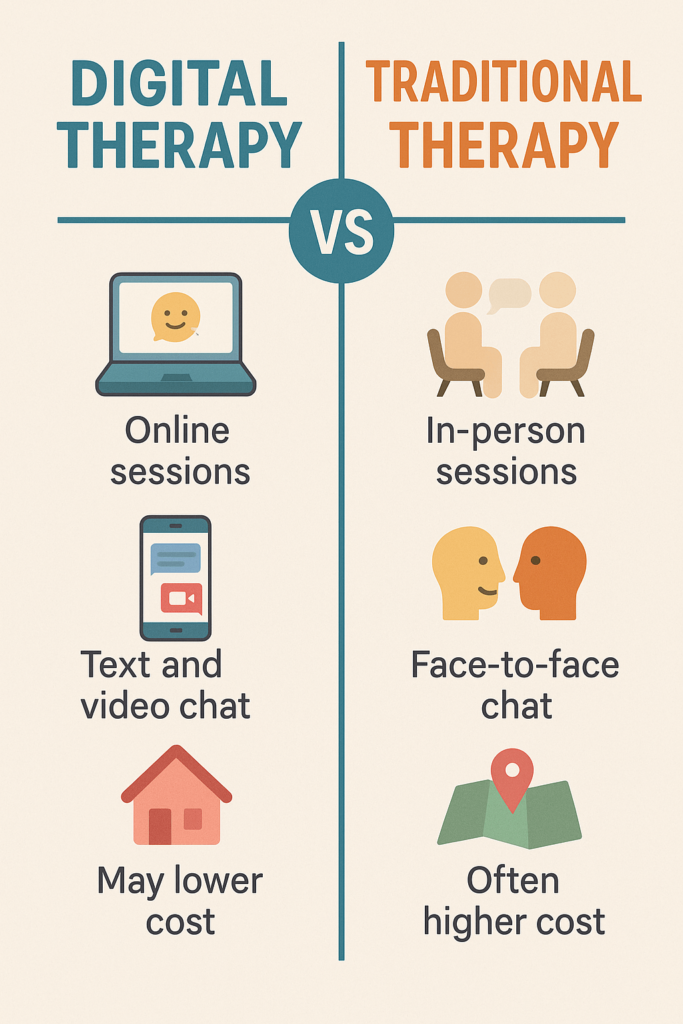
Accessibility and Convenience
Digital counseling eliminates geographical barriers that often limit access to quality mental health care. Whether you live in a rural area with limited therapist availability or have mobility challenges that make traveling to appointments difficult, messaging therapy provides equal access to licensed professionals. You can engage in therapeutic work from your home, office, or anywhere you feel comfortable.
Traditional therapy requires commuting to appointments, finding parking, and sitting in waiting rooms – activities that can increase anxiety for many people. Digital approaches remove these logistical barriers while providing the same professional support from licensed therapists.
Research from the American Psychological Association confirms that digital delivery methods can be particularly beneficial for individuals with social anxiety or those who feel more comfortable expressing themselves in writing.
Scheduling Flexibility
One of the most significant advantages is scheduling flexibility. Traditional therapy typically operates during standard business hours, making it challenging for people with demanding work schedules, childcare responsibilities, or irregular hours to attend regular sessions. Text based therapy allows you to engage in therapeutic work whenever you need support, whether that’s early morning, late evening, or during weekend hours.
This flexibility proves particularly valuable for millennials juggling multiple responsibilities and unpredictable schedules. You can send messages during your lunch break, process difficult emotions immediately after they arise, or seek guidance during challenging moments without waiting for your next scheduled appointment.
Response Time and Crisis Support
While traditional therapy provides immediate interaction during scheduled sessions, digital counseling offers ongoing availability that can be crucial during mental health crises. Many platforms provide same-day responses, and some offer crisis text support for urgent situations.
The crisis text line model has proven highly effective for immediate mental health intervention, with trained crisis counselors available 24/7 to provide support during emergencies. Organizations like the Crisis Text Line demonstrate the life-saving potential of immediate digital access to mental health support.
Cost and Insurance Coverage
Digital therapy often proves more affordable than traditional therapy, with many platforms accepting major insurance plans and offering competitive out-of-pocket rates. The average cost ranges from $60-$90 per week, compared to $100-$200 per session for traditional therapy.
Many employers now offer digital mental health services through Employee Assistance Programs (EAPs), making this form of mental health care even more accessible. Additionally, messaging therapy eliminates indirect costs like transportation, parking, and time off work that often accompany traditional therapy appointments.
Therapeutic Effectiveness
Research consistently demonstrates that text based therapy can be as effective as traditional face therapy for many mental health conditions. A comprehensive study published in the Journal of Medical Internet Research found that digital therapy produced comparable outcomes to in-person therapy for treating depression and anxiety disorders.
The effectiveness particularly shines in cognitive behavioral therapy applications, where written exercises and homework assignments align naturally with the messaging format. Many therapeutic interventions translate well to written communication, allowing therapists to provide structured guidance and support through carefully crafted messages.
The Science Behind Digital Therapy Effectiveness
Understanding the research supporting messaging therapy helps validate this treatment approach and addresses common concerns about its effectiveness compared to traditional mental health services.
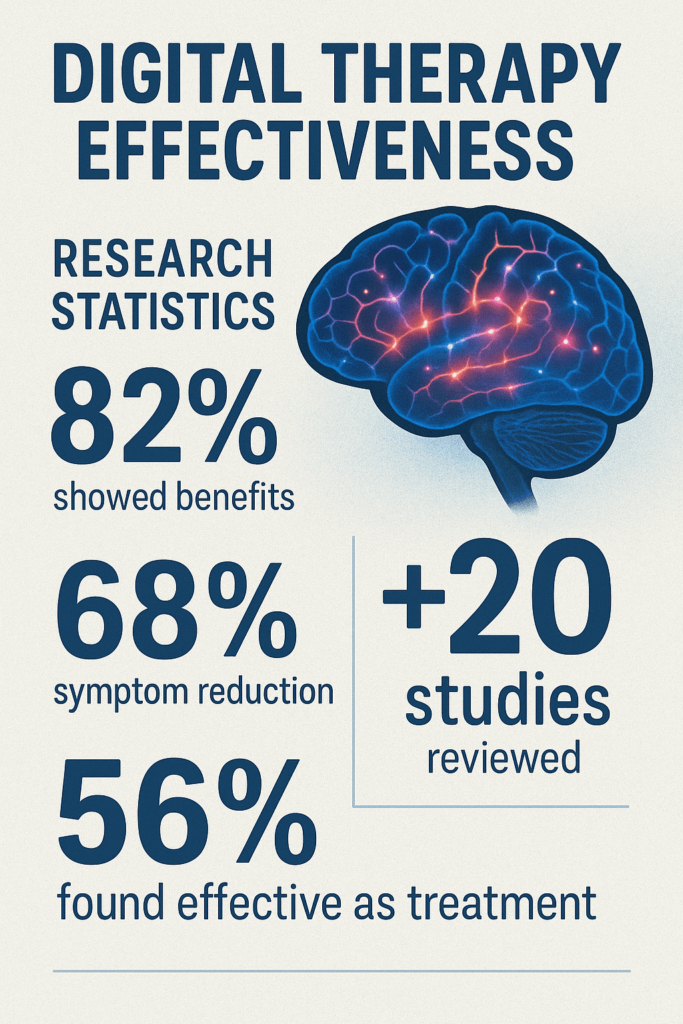
Evidence-Based Research Findings
Multiple peer-reviewed studies have examined the effectiveness across various mental health conditions. A landmark study published in the Journal of Telemedicine and e-Health found that digital platforms produced outcomes comparable to traditional therapy while generating higher satisfaction scores for accessibility and convenience.
Research from TIME Magazine’s analysis of recent studies shows that messaging therapy is particularly effective for cognitive behavioral therapy delivery. The structured, homework-based nature of CBT aligns well with written communication, allowing therapists to provide detailed explanations, assign exercises, and track progress through digital interactions.
State-Based Learning Benefits
One significant advantage involves the psychological principle of state-based learning. This concept suggests that people retain and apply information more effectively when they learn it in the same environment where they’ll use it. Digital therapy allows you to develop coping skills and practice therapeutic techniques in your actual living environment, potentially improving the transfer of therapeutic insights to daily life.
Traditional therapy sessions occur in clinical settings that may feel removed from your everyday challenges. Messaging therapy integrates seamlessly into your natural environment, allowing you to practice mindfulness techniques at home, use anxiety management strategies at work, or apply communication skills in real relationship situations.
Neurodivergent and Accessibility Advantages
Digital counseling offers unique benefits for neurodivergent individuals and those with certain accessibility needs. Many people with autism spectrum disorders, social anxiety, or communication differences find written communication less overwhelming than face-to-face interactions. The asynchronous nature allows time to process questions and formulate thoughtful responses without the pressure of immediate verbal communication.
Additionally, messaging platforms provide a written record of therapeutic insights and homework assignments, which can be particularly valuable for individuals with attention difficulties or memory challenges. You can revisit previous conversations, re-read coping strategies, and reference therapeutic techniques whenever needed.
Digital Therapy for Specific Mental Health Conditions
Text based therapy proves particularly effective for treating specific mental health conditions that respond well to written therapeutic interventions and ongoing support.
Anxiety Disorders and Digital Support
Digital counseling offers unique advantages for managing anxiety disorders, providing immediate access to support during panic attacks or anxiety spirals. When anxiety strikes outside of traditional therapy hours, you can reach out to your therapist via messaging and receive grounding techniques, cognitive restructuring guidance, or reassurance.
Cognitive behavioral therapy techniques for anxiety translate exceptionally well to the digital format. Therapists can guide you through thought challenging exercises, help you identify anxiety triggers, and provide homework assignments that reinforce healthy coping mechanisms. The ability to practice these techniques in real-time, in your actual environment, often leads to better skill generalization and anxiety management.
Many platforms also integrate with anxiety tracking apps, allowing therapists to monitor your symptoms and adjust treatment approaches based on real-time data. This continuous monitoring can help identify patterns and triggers that might be missed in weekly traditional therapy sessions.
Depression Treatment Through Digital Channels
Depression often involves feelings of isolation and disconnection that can make traveling to therapy appointments feel overwhelming. Digital therapy removes these barriers while providing consistent support during depressive episodes.
The written nature allows for detailed exploration of negative thought patterns, mood tracking, and behavioral activation assignments. Therapists can provide daily check-ins, mood monitoring, and encouragement that helps combat the isolation and hopelessness often associated with depression.
Behavioral activation, a key component of depression treatment, works particularly well through messaging platforms. Therapists can assign specific activities, check in on completion, and provide encouragement throughout the week. This ongoing support helps maintain momentum between traditional therapy sessions and can significantly improve treatment outcomes.
Trauma-Informed Digital Therapy
Trauma therapy through messaging requires specialized training and careful consideration of safety protocols. However, when implemented properly, digital platforms can provide valuable support for trauma survivors who may feel triggered by face-to-face interactions or clinical environments.
The controlled nature allows trauma survivors to engage in therapeutic work at their own pace, taking breaks when needed and processing difficult material in a safe environment. Therapists can provide grounding techniques via messaging, assign trauma-focused homework, and offer consistent support during challenging processing periods.
Many trauma survivors appreciate the ability to revisit therapeutic conversations and coping strategies through their message history. This reference material can be particularly valuable during flashbacks or difficult moments when immediate therapist contact isn’t available.
Choosing the Right Platform: What to Look For
Selecting an appropriate digital therapy service requires careful consideration of several factors that impact both treatment effectiveness and user experience.
Therapist Credentials and Specializations
Ensure any platform employs fully licensed mental health professionals with appropriate credentials for your state. Look for therapists with specific training in your areas of concern, whether that’s anxiety, depression, trauma, or relationship issues.
Quality platforms provide detailed therapist profiles that include education, licensure information, specializations, and therapeutic approaches. This transparency allows you to make informed decisions about which therapist might best serve your needs.
Platform Security and HIPAA Compliance
Mental health care requires strict confidentiality protections, making platform security a crucial consideration. Verify that any service uses end-to-end encryption, secure servers, and HIPAA-compliant communication protocols.
Ask about data storage policies, who has access to your messages, and how long conversations are retained. Reputable platforms will clearly outline their privacy policies and security measures to protect your sensitive information.
Response Time and Availability
Different platforms offer varying response schedules, from multiple daily responses to 24-48 hour response windows. Consider your needs and preferences when evaluating these options. Some people prefer frequent, brief interactions, while others benefit from longer, more detailed responses.
Many platforms also offer crisis support or unlimited messaging options that provide additional help during challenging periods. Clarify these policies upfront to ensure the service meets your support needs.
Digital Therapy at The Empowering Space
The Empowering Space recognizes the unique mental health needs of millennials and provides specialized text based therapy services designed to fit your busy lifestyle while delivering evidence-based treatment.

Our Approach to Digital Counseling
Licensed therapists understand that millennials face unprecedented challenges, from student debt and career pressure to social media overwhelm and relationship complexities. Our digital therapy services address these modern stressors through culturally competent, age-appropriate interventions.
We specialize in treating anxiety, depression, and trauma through messaging platforms, using approaches like cognitive behavioral therapy, EMDR techniques adapted for written communication, and mindfulness-based interventions. Our therapists receive specialized training in digital therapy delivery to ensure you receive the same quality care you’d expect from traditional face therapy.
You can learn more about our comprehensive approach in our article about Virtual Couples Therapy: Strengthening Relationships from Anywhere and discover how we address specific concerns in our guide to Overcoming Loss Through Grief Therapy.
Flexible and Affordable Options
Understanding the financial pressures facing millennials, The Empowering Space offers digital therapy services starting at just $35 with our trained intern therapists. We accept major insurance plans and work with you to find affordable options that fit your budget.
Our platform provides unlimited messaging with guaranteed response times, ensuring you have access to support when you need it most. Whether you’re dealing with work stress, relationship challenges, or mental health conditions, our therapists are available to provide professional guidance and support.
For those interested in exploring different therapeutic approaches, check out our articles on How Cognitive Behavioral Therapy Helps Manage Anxiety and Exploring Specialized Virtual Therapy Services.
Specialized Programs and Integration
The Empowering Space offers specialized programs for specific populations and concerns. Our couples therapy services include digital relationship coaching and communication skill building through our Couples Mediation Therapy: Resolve Conflicts & Improve Communication program.
We also provide trauma-informed digital therapy for individuals working through past experiences or current stressful situations. Learn more about our trauma-focused approach in our comprehensive guide Know A to Z of trauma therapy salt lake city and our specialized Trauma-Informed Couples Therapy services.
Our platform integrates seamlessly with video therapy sessions when face-to-face interaction would benefit your treatment. This flexibility allows you to start with messaging therapy and add other modalities as needed, ensuring continuity of care throughout your mental health journey.
Getting Started with Digital Therapy
Beginning your digital therapy journey requires some preparation and consideration to ensure the best possible outcomes.

Preparing for Your First Digital Session
Before starting, take time to reflect on your goals, concerns, and preferences. Consider what specific mental health conditions or life challenges you want to address, and think about what therapeutic approaches have helped you in the past.
Prepare a brief overview of your mental health history, including any previous therapy experiences, current medications, and significant life events that impact your wellbeing. This information helps your therapist understand your background and develop an appropriate treatment plan.
For guidance on what to expect, read our article about What Is Text-Based Therapy? Benefits & How It Works and explore our comprehensive resource on Essential Medication Management Practices if you’re currently taking mental health medications.
Setting Up Your Communication Preferences
Discuss communication preferences with your therapist early in the process. Some people prefer frequent, brief check-ins throughout the day, while others benefit from longer, more detailed exchanges. Clarify response time expectations and emergency protocols for crisis situations.
Consider your schedule and when you’re most likely to engage meaningfully in therapeutic conversations. Some people prefer morning reflections, while others process better in the evening. Communicating these preferences helps your therapist optimize their response timing.
Creating a Supportive Environment
Digital therapy works best when you have a private, comfortable space for meaningful communication. Consider where you’ll typically send messages and ensure you have adequate privacy for honest, open communication.
Think about how you’ll incorporate therapeutic homework and exercises into your daily routine. Text based therapy often includes assignments and skill practice that require dedicated time and attention outside of your messaging sessions.
Explore our resources on Personal Growth Through Counseling and Achieving Your Goals Through Counseling Therapy to better understand how to maximize your therapeutic journey.
Maximizing Your Digital Therapy Experience
Getting the most benefit from messaging therapy involves actively engaging in the process and utilizing available resources effectively.

Effective Communication Strategies
Digital counseling requires clear, detailed communication to ensure your therapist understands your experiences and concerns. Be specific about situations, emotions, and thoughts rather than using general terms. For example, instead of saying “I feel bad,” describe specific emotions like “I feel overwhelmed by work deadlines and worried about disappointing my boss.”
Use descriptive language to help your therapist understand the context of your experiences. Describe settings, relationships, and circumstances that contribute to your mental health concerns. This detailed information helps therapists provide more targeted interventions and support.
Utilizing Between-Session Support
One major advantage is access to support between traditional therapy sessions. Use this opportunity to practice new coping skills, report on homework assignments, and seek guidance when facing challenging situations.
Don’t wait for crisis moments to engage with your therapist. Regular check-ins about mood, stress levels, and daily experiences help maintain therapeutic momentum and allow for early intervention when problems arise.
For additional support resources, explore our articles on Mental Health Awareness and Counseling and How to Find Culturally Sensitive Counseling.
Tracking Progress and Insights
Keep a record of insights, coping strategies, and progress markers discussed in your conversations. Many people find it helpful to screenshot particularly meaningful exchanges or copy important coping techniques into a notes app for easy reference.
Use your message history as a therapeutic tool. Review previous conversations when facing similar challenges, and notice patterns in your thoughts, emotions, and behaviors over time. This self-reflection can accelerate therapeutic progress and increase self-awareness.
Combining Digital Therapy with Other Resources
Text based therapy works well in combination with other mental health resources. Consider supplementing your digital therapy with support groups, mental health apps, mindfulness practices, or educational resources related to your specific concerns.
Many people benefit from combining messaging therapy with occasional video therapy sessions for more complex processing or when visual connection would enhance the therapeutic relationship. Read about additional therapeutic options in our articles on The Connection Between Yoga and Therapy and Supporting Love: Couples Virtual Therapy.
Insurance Coverage and Affordability
Understanding insurance coverage and payment options makes digital therapy more accessible and affordable for most people.
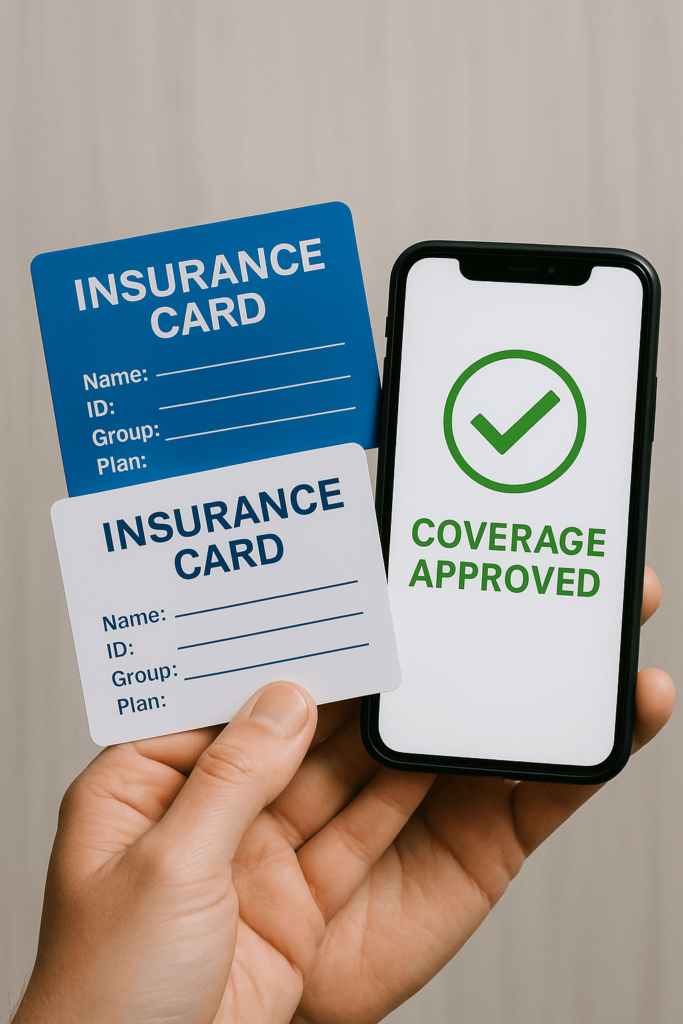
Major Insurance Plans and Coverage
Many major insurance plans now recognize text based therapy as a legitimate form of mental health care and provide coverage comparable to traditional therapy services. Plans from providers like Aetna, Blue Cross Blue Shield, Cigna, and others often cover digital therapy with standard mental health copays.
Contact your insurance provider to verify coverage and understand any limitations or requirements. Some plans require prior authorization or limit the number of covered sessions, while others provide full coverage for unlimited messaging services.
According to recent data from Talkspace, most major health insurance plans now cover digital therapy platforms, with typical copays ranging from $15-$30 per session.
Employee Assistance Programs and Employer Benefits
Many employers offer digital therapy services through Employee Assistance Programs (EAPs) or as part of comprehensive mental health benefits packages. These programs often provide free or low-cost access to messaging therapy services for employees and their families.
Check with your human resources department about available mental health benefits, including digital therapy options. Some employers partner directly with platforms to provide enhanced access and coverage for their workforce.
Out-of-Pocket Costs and Payment Options
For those paying privately, digital therapy often costs less than traditional therapy while providing more frequent access to support. Typical rates range from $35-$90 per week for unlimited messaging services, compared to $100-$200 per session for traditional therapy.
Many platforms accept Health Savings Account (HSA) and Flexible Spending Account (FSA) payments, making services more affordable through pre-tax dollars. Some platforms also offer sliding scale fees or financial assistance programs for individuals with limited income.
For more information about managing therapy costs, read our guide on Smart Approaches to Medication Management which includes tips for optimizing your mental health budget.
Future of Digital Mental Health
Text based therapy continues evolving as technology advances and mental health care becomes increasingly digital.
Emerging Technologies and Integration
Artificial intelligence and machine learning technologies are beginning to enhance digital therapy platforms through improved therapist matching, crisis detection, and personalized treatment recommendations. These tools help optimize therapeutic outcomes while maintaining the human connection essential to effective mental health care.
Integration with wearable devices and mental health apps provides therapists with additional data about sleep patterns, mood fluctuations, and stress levels. This information can inform treatment planning and help identify patterns that might not be apparent through conversation alone.
Expanding Access and Reach
Digital therapy continues expanding access to mental health care for underserved populations, including rural communities, individuals with mobility limitations, and those facing stigma around traditional mental health services. This democratization of mental health care addresses significant gaps in service availability and accessibility.
Research from the National Center for Biotechnology Information shows promising results for youth mental health interventions delivered through digital platforms, suggesting broader applications across age groups and populations.
Research and Evidence Development
Ongoing research continues building the evidence base for digital therapy effectiveness across various mental health conditions and populations. Long-term outcome studies and comparative effectiveness research help refine best practices and identify optimal applications.
Research into specific therapeutic modalities adapted for digital delivery helps therapists provide more effective interventions through written communication. This evidence development supports broader acceptance and integration of digital therapy into mainstream mental health care.
Conclusion: Embracing the Future of Mental Health Care
Text based therapy represents a significant advancement in mental health care delivery, offering accessible, affordable, and effective treatment options for modern lifestyles. The research consistently demonstrates that digital therapy can provide outcomes comparable to traditional face therapy while offering unique advantages in accessibility, convenience, and ongoing support.

Navigating complex life challenges, career pressures, and relationship dynamics, digital therapy provides a comfortable way to access mental health support. Engaging in therapeutic work from anywhere, at any time, removes barriers that often prevent people from seeking the help they need.
The Empowering Space understands these modern challenges and provides specialized services designed to meet your unique needs. Our licensed therapists combine evidence-based approaches with cultural competence to deliver high-quality mental health care through secure, convenient platforms.
Whether you’re dealing with anxiety, depression, trauma, relationship challenges, or need support navigating life’s complexities, digital therapy offers a flexible, effective solution. The ability to access unlimited messaging, receive crisis support, and work with specialized therapists makes this approach an invaluable resource for modern mental health care.
Explore more in our articles about Know All About Online Therapy in Texas, Family Wellness: Virtual Therapy Services, and Emotional Wellness: Therapy Services.
Ready to experience the benefits of digital mental health support? The Empowering Space offers comprehensive services with licensed therapists who understand your generation’s unique challenges. Our platform provides secure, confidential communication with guaranteed response times and unlimited messaging support.
Take the first step toward better mental health today.Contact The Empowering Space to schedule your consultation and discover how text based therapy can support your journey toward healing, growth, and empowerment. Your mental health matters, and we’re here to help you access the support you deserve, whenever and wherever you need it.
Ready to start your digital therapy journey? Book your first session with The Empowering Space today and experience the future of mental health care.
